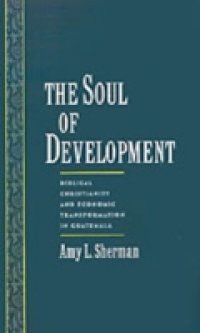Ever since Max Weber started an argument about the role of Protestantism in jump-starting northern Europe's economic development, scholars have clashed over the influence of religion and culture on a society's (or an individual's) economic prospects. Today, many wonder whether the "explosion" of Protestantism in Latin America will effect a similar wave of growth and democratization. In this book, Sherman compiles the results of her field study and national survey of 1000 rural Guatemalan households. She offers persuasive evidence that, in Guatemala and throughout the region, religious world-views significantly influence economic life. Sherman explains how the change in attitude and behavior that accompanies conversion from animism to a Biblically orthodox world-view has improved the domestic welfare and economic status of many families. Further, she asserts that this new attitude, sympathetic to democratic-capitalism, has created a "moral cultural soil" in which freedom, personal empowerment, an enhanced status for women, and a desire to get ahead can be nurtured.

